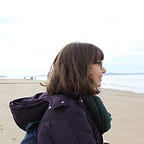#24: The Diary
‘I never travel without my diary. One should always have something sensational to read in the train.’ — Oscar Wilde
I do, however, frequently travel without my diary. It is a part of my room, something I return to at the end of a day to become at home with myself again.
But then diaries can have very different purposes. They might be intended for publication or purely for the process of writing. They might painstakingly and purposefully record factual detail, a ship’s log for instance, marking travel paths and tides. They might be a list of appointments, a mere catalogue of dates, allocating segments of the day.
My diary does not accurately show the passing of time. I cannot even roughly equate the number of pages to a number of days. I might write twice a day or twice a month. It varies as the intention of a diary may vary.
A diary’s purpose shifts and merges when a personal diary exists within a historical moment, when private thoughts become of public significance. Think Samuel Pepys. Think Anne Frank.
But I cannot imagine making my diary public, even if somehow my small life collided with events of great importance. Diaries often have connotations of secrecy, from the easily-picked padlocks on sparkly childhood notebooks, to the pin codes on today’s diary apps.
For my younger self, there was always this idea that diaries were containers of secrets, secrets that were concrete and definable: the name of a crush, a specific piece of overheard gossip, secrets that could be ‘found out’ and immediately known.
But now I have a different sense of privacy. There are no particular ‘secrets’ I would not tell. But there are things I would not say to a stranger, things I would phrase carefully, things I just might find difficult to say, things I want to express on a forgivable page before throwing them out of my mouth and into the world.
My diary would not be very interesting to you. It is an endless patterning and reworking of similar thoughts, without progression so much as gradual expansion and cementation. A thought does not exist until articulated and so my diary is my draft self, full of crossings out and rearranging, figuring out my current self before I present it to the world.
And this is why we often turn to diaries to understand people and their work. Critics carefully crawl through journals trying to understand writers’ thought-processes at particular moments, to better understand their texts.
Yet, in a way, I would rather sweepingly argue that the two things are distinct. Even this blog post here, about my diary, is separate from it. My diary is in flux, unedited. It is not a rawer, purer, truer version of me, or this post, but me in movement, me when the gears are still slotting into place, me when I am tired before bed, me when I have not quite woken into myself.
So the most I am offering of my diary is a photo, which even then is transitional, as I continue doodling over the cover, making more marks, making more of myself.
